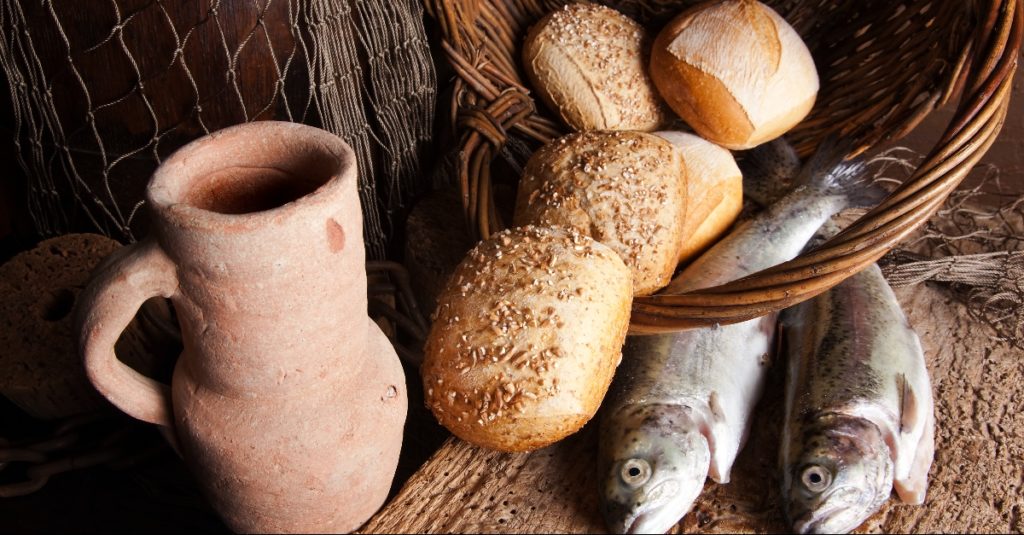Readings: Ezekiel 37:1–14 | Acts 2:1–21 | John 15:26-27, 16:4b-15
Text: John 15:26-27, 16:4b-15
The Day of Pentecost often gets a lot of attention because of how exciting it was. From our second reading, we heard about the events of the day: a sound like a mighty rushing wind which got people’s attention, tongues as of fire, miraculously speaking other languages previously not studied, and so on.

But the impressive outward show is often not the point with God. After He had fed over 5,000 people with five loaves and two fish, the crowds followed Jesus all the way around the Sea of Tiberius because they ate bread. When it came to actually accepting what that sign meant, many of them said, “This is a hard saying; who can listen to it?” and went away. (John 6:1-60). God grant that our faith not be in the fireworks of Pentecost, but in the working and power of the Holy Spirit.
God helping us, if we listen the texts appointed for today with ears of faith, yes, the Holy Spirit is the One we focus on this Pentecost, but what is it that He is doing?
Pentecost isn’t the first time the Holy Spirit shows up. He has been at work in creation from the very beginning: “And the Spirit of God was hovering over the face of the waters” (Genesis 1:2). In the Introit, we prayed together with our ancestors in Israel, from Psalm 104,
27 These all look to you,
to give them their food in due season.
28 When you give it to them, they
gather it up;
when you open your hand, they
are filled with good things.
29 When you hide your face,
they are dismayed;
when you take away their breath, they die
and return to their dust.
30 When you send forth your Spirit,
they are created,
and you renew the face of the ground.
(Ps. 104:27-30)
God’s Spirit is the source of life as we all know it, and all on earth enjoy that gift. Not only that, but we can see God providing for the needs (not always the wants) of all His creatures.

But the Holy Spirit has so much more that He does beyond physical life and daily bread. In the Old Testament lesson, this is what the Spirit does in these last days:
4 Then he said to me, “Prophesy over these bones, and say to them, O dry bones, hear the word of the Lord. 5 Thus says the Lord God to these bones: Behold, I will cause breath to enter you, and you shall live. 6 And I will lay sinews upon you, and will cause flesh to come upon you, and cover you with skin, and put breath in you, and you shall live, and you shall know that I am the Lord.”
The word for Spirit and breath is the same (ru’ach), and the double meaning is intentional. The Spirit (God’s breath) is giving life, but not only a beating heart and respiration. There’s more: He puts breath into us, and we shall live…and you shall know that I am the Lord.
This is what we confessed in the Nicene Creed, too. “I believe in the Holy Spirit, the Lord and Giver of Life.” The Holy Spirit breathes into us and gives us true life. Anyone who has suffered from asthma or congestive heart failure has experienced breath being stifled. That’s akin to what sin and death has done to our natural life on earth. Even though God has breathed into us the breath of life, it is shorted by disease, and robbed from us by death. But the Spirit breathes into us the true life, even as we can identify with the words, “Our bones are dried up, and our hope is lost; we are indeed cut off,” (Ezek. 37:11) so the Holy Spirit breathes into us and makes us alive through Jesus’ resurrection.

And we also hear how that Breath of God is a Voice which goes out to every nation in the second reading (Acts 2:1-21). Don’t get caught up on the sudden way these Galileans were able to speak in many human languages; the focus is on what they heard from this Voice of God:
17 “ ‘And in the last days it shall be,
God declares,
that I will pour out my Spirit on all flesh,
and your sons and your daughters
shall prophesy…
21 And it shall come to pass
that everyone who
calls upon the name of the
Lord shall be saved.’
That’s what happened to the hearers on Pentecost, that Jews and proselytes from diverse countries from as west as Rome to the east as Persia, north as modern day Turkey (Asia Minor) to south as Arabia—“Thus says the Lord God: Come from the four winds, O breath, and breathe on these slain, that they may live.” (Ezek. 37:9). All of these people, from many nations, many things distinguishing them from each other, were called by the Holy Spirit to believe and have life from the world’s Savior.

This is the ongoing work of Pentecost. It’s not about being overtaken by the Spirit, suddenly speaking in new tongues. It’s that all people are called to salvation in Jesus Christ, so that at the end of the age, we will see what Revelation 7 records:
“9 After this I looked, and behold, a great multitude that no one could number, from every nation, from all tribes and peoples and [tongues], standing before the throne and before the Lamb, clothed in white robes, with palm branches in their hands, 10 and crying out with a loud voice, “Salvation belongs to our God who sits on the throne, and to the Lamb!”
Taking a cue from the excitement of that day, the Azusa Street Revival in Los Angeles in 1906 marked the arrival of the Pentecostal movement, teaching that we should continue to look for the Holy Spirit to revive the church by causing people to speak in strange languages and manifest miraculous healings. The prompting for revivals like the Pentecostal movement was because leaders saw the signs of the end times, and yet despite that it seemed faith had grown cold, and separated from the zeal recorded in Acts. Their response was to look for miraculous healings, and sudden conversion experiences. The trouble is while God gave this visible sign of what He is doing, He doesn’t promise that this will always be the case.
The things Jesus assures His of are described in the Gospel:
26 “But when the Helper comes, whom I shall send to you from the Father, the Spirit of truth who proceeds from the Father, He will testify of Me. 27 And you also will bear witness, because you have been with Me from the beginning.

The word for Helper is literally Paraclete, an advocate who is called to one’s side to assist them, especially in a court of law. Well, as we heard last week, testimony, or martyria, is how the world around us learns of Christ. Jesus said this in the Upper Room with His disciples on the night in which He was betrayed. The Holy Spirit, the Comforter, testifies of the Son of God. Then, in turn, some of the Twelve (and later St. Paul) would be testify of Him—in the Scriptures of the New Testament, all written by or under the guidance of these chosen men.
But the Son must ascend into heaven before sending the Holy Spirit. This is the start of the age of the Church, where the eternal life and salvation which Christ has brought for all people, is proclaimed with His almighty power. It isn’t limited to a small group or a certain place, but “that repentance for the forgiveness of sins should be proclaimed in his name to all nations, beginning from Jerusalem.” (Luke 24:47) And this is what the Holy Spirit does among all people where His Voice is heard:
8 And when he comes, he will convict the world concerning sin and righteousness and judgment: 9 concerning sin, because they do not believe in me; 10 concerning righteousness, because I go to the Father, and you will see me no longer; 11 concerning judgment, because the ruler of this world is judged.
12 “I still have many things to say to you, but you cannot bear them now. 13 When the Spirit of truth comes, he will guide you into all the truth, for he will not speak on his own authority, but whatever he hears he will speak, and he will declare to you the things that are to come. 14 He will glorify me, for he will take what is mine and declare it to you.

Nowhere do you hear that the Holy Spirit will cause flashy signs as were on the day of Pentecost. He does what the Word of God is given to do: convict people of their unbelief in the only Savior, righteousness as the only one worthy to ascend into heaven, and judgment that the Devil has been defeated. These are the mighty deeds which the people in Jerusalem heard, and which you, too have heard.
You see, the Holy Spirit doesn’t ever focus on Himself, but teaches us to rightly know Jesus as our Savior. He calls us spiritually dead sinners to repentance, teaches us to truly know the Lord, comes to us in our struggles and weakness and guides us out of our error and into all the truth.
The Holy Spirit’s work has continued uninterrupted in the Church, even to our day, because sinners like you and me are called to believe in Jesus Christ, living by the promise, “Everyone who calls on the Name of the Lord will be saved” (Acts 2:21). By this Gospel, good news, the work is accomplished that we know the Lord, that the same Holy Spirit keeps us in this faith in our trials, and actually strengthens our faith through what we suffer. And then on the Last Day, we await when the Holy Spirit will raise us from our graves and our eyes will behold an amazing thing: “16 For the Lord himself will descend from heaven with a cry of command, with the voice of an archangel, and with the sound of the trumpet of God. And the dead in Christ will rise first. 17 Then we who are alive, who are left, will be caught up together with them in the clouds to meet the Lord in the air, and so we will always be with the Lord.” (1 Thess. 4:16-18)
So be it, Lord, through Jesus Christ, your Son, our Lord and Savior. Amen.

Leave a Reply